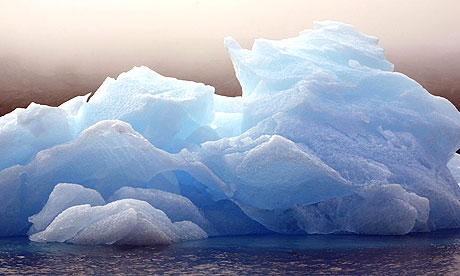Arctic Ministers hope potential mineral wealth and hydro-electricity will allow nation to break free from Denmark

Changing landscape - an iceberg off Ammassalik island, Greenland. Native people are being forced to retrain as their traditional livelihood disappears along with the ice. Photograph: John McConnico/AP
Helicopters have been hard to hire in Greenland this summer. In most countries that would not be a big problem, but for the locals on the world's biggest island - where there are no road networks and sparse settlements are often 100 miles apart - it can make life tricky.
The scarcity has been caused by a diamond rush with prospectors, mostly from North America, believing they can strike it rich. As the ice cap recedes due to rising temperatures, rock covered for centuries could produce spectacular finds. The interest in the Greenland tundra was sparked partly by the announcement this year of the discovery of a 2.4-carat diamond at Garnet lake in west Greenland, the largest of 236 diamonds found in a trial dig in the area by Hudson Resources of Vancouver.
While the Hudson company was willing to announce its find, presumably to encourage its investors, most prospectors are less keen to discuss their activities in this vast mineral rich wilderness.
The belief in Greenland's potential riches stems from the fact that the geology is identical to that found across the now ice-free north-west passage in Canada, which has led to large opencast mining in the Arctic region.
But Greenland has other potential riches too. Gold has been discovered and is already being mined, although so far at a loss, and there are deposits of other minerals such as zinc, that could be exploited. Oil giants are negotiating licences to explore blocks of the coastline covering thousands of square miles.
The dash for minerals is fuelling another debate in Greenland: whether the country should go for independence from Denmark. With its 56,000 population scattered over an area almost the size of Europe, Greenland is heavily dependent on a subsidy from Denmark for survival. The island has internal self-government but Denmark is responsible for foreign policy.
Aleqa Hammond, the foreign minister in Greenland's home-rule government, hopes that the oil and mineral companies moving in will create sufficient wealth for her country to break from colonial rule. "It is natural for a country to want to be independent. We do not feel ourselves part of Europe - we are an Arctic people - but our way of life is changing and we have to change with it. My mother's generation fought for Greenland homeland government and achieved it in 1979, leaving only foreign affairs and defence in the hands of Denmark.
"Then, we could not strike out alone because we were so heavily dependent on Danish money, and we still are, but we can change that by exploiting our natural resources to achieve financial and political independence."
But some argue that independence has dangers. Greenland is the land mass closest to the North Pole and has rapidly assumed greater strategic importance as its much more powerful and populous neighbours vie for a slice of the Arctic's supposed mineral wealth. The United States is strengthening its air base at Thule on the extreme north of the island and the Russians have already planted flags on the sea bed.
But rather than putting her faith in mineral wealth, Mrs Hammond believes that her country's best prospect of buying its independence lies in hydro-electricity. The vast lakes and melting ice cap provide enormous potential for electricity free from fossil fuel and the Greenland government is negotiating with Alcoa, an aluminium company, to built the world's second largest smelter. No contract has been signed but the minister hopes this project will provide 3,500 much-needed jobs.
It was ironic, she says, that climate change had melted the ice sufficiently for prospectors to move in, and that might in turn give the nation its independence. A referendum in Denmark had shown a majority in favour of granting Greenland home rule. "We hope it will happen soon."
But Professor Minik Rosing, of the University of Copenhagen, who was born in Greenland, believes it would be a disaster if his country had a big oil find and used the revenue to buy independence. "As everybody gets more desperate for that commodity you do not want to be a very, very small, very independent country, very far from anywhere else. Much better to stay with the friend you know."
A major mineral find could be catastrophic, he said. "With such a small population we could be overwhelmed by people coming to work here. We should be cautious of suddenly finding ourselves in the minority."
Aqqaluk Lynge, an Inuit leader and former chairman of the Inuit Circumpolar Conference, is also cautious about independence. "Frankly I think it is still a long way off. We do not want to rush into these things. We need to avoid conflict and assess exactly what the resources and options are before we make decisions."
Mrs Hammond's government has introduced education programmes so that native hunters can retrain to prepare for new lives and independence. "The fact is we cannot go on as we are," she said. "The hunters wait one month later for the ice to form and it melts one month earlier in the spring. It is like an employer taking away three months of your pay without notice. They cannot find enough food for themselves and their dogs. Less than 500 of the whole population can now survive only by hunting."

No comments:
Post a Comment